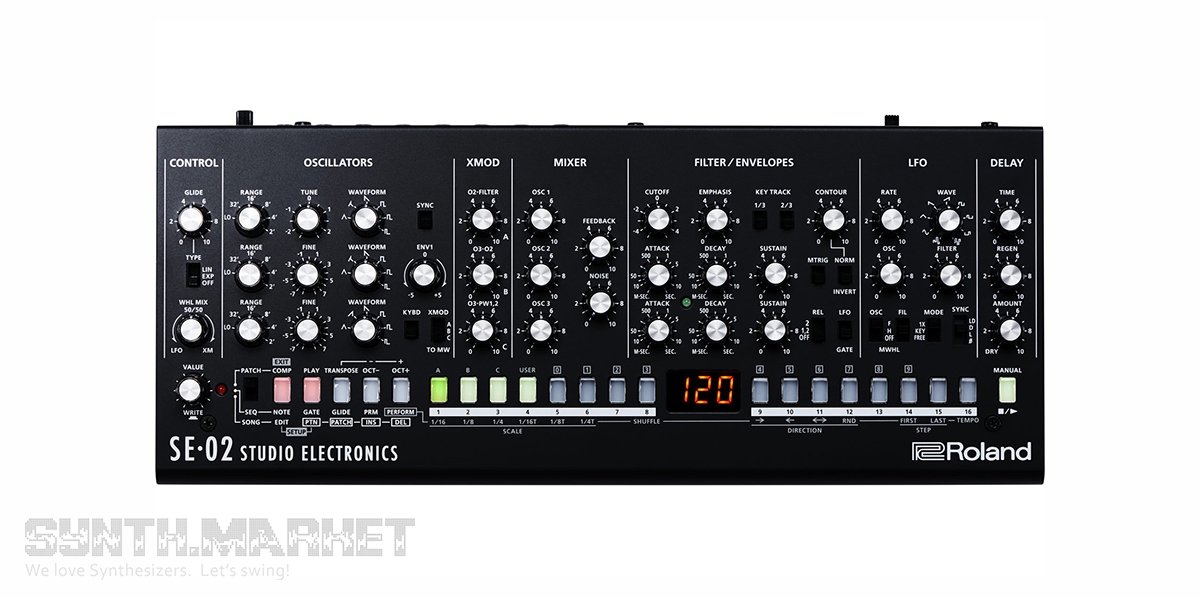Leading Japanese manufacturer of electronic musical instruments has an incomparable experience in creating analog synthesizers. It’s history shines with the cult instruments of the 70's and 80's - Jupiter-4, Jupiter-6, Jupiter-8; Juno-6, Juno-60, Juno-106, JX-3P, JX-8P, iconic series of SH monosynths featuring superb SH-101, as well as SH-1, SH-7 (duophonic), SH-09. In the 90's Roland rejected the analog and rushed into the digital battle, creating in the next 20 years by no means less worthy and popular digital synthesizers.
But here came the 2000s embracing the analog culture with pure addiction, horrendously escalating and magnetizing the new fans into the vintage geeks army. Initially, Roland's management didn’t consider it as a serious menace, stubbornly insisting that the past has nothing to do with the technology and innovations, and the profit seemed illusive to them. However, the cult of "real analog sound" made Roland release JD-XA and JD-Xi - the most interesting hybrid instruments.
Meanwhile, the real analogue boom detonated and such famous market players as Novation, Behringer and Arturia turned to analogue - the first one has a significant background, the second one can afford to hire the best engineers and has large production capacities, and the third one simply returned to basics after all the cult analog synths was cloned by the brand. Not to mention the persistence with which Dave Smith followed unswervingly the classic principles (yes, Prophet VS happened to Dave and SCI, but it’s all because of John Bowen :).
So, for the last year we’ve seen both Behringer DeepMind 12, and Arturia MatrixBrute, and the reincarnation of classics - DSI REV2, and the hybrid Novation Peak, as well as many new analog devices by the module makers. Meanwhile, Roland kept standing still on the sidelines or simply didn’t report on the company’s plans, supposing we should be content with analog modeling (System-8 and new Roland Boutique series modules) and hybrid technologies (JD-XA and JD-Xi).
And on June 20, 2017 the miracle happened. Roland got back to the “analogue camp”. The curious thing is that the brand did it with the help of Studio Electronics, which is well-known but not for everybody and produces expensive equipment for modular systems, and it used to occupy a niche of rack devices as well. Apparently, the Japanese company has firmly decided to not take risks and to not get involved in adventure alone, which is clear considering the latest developments - cooperation with Serato when releasing DJ-808 and purchase of V-MODA assets.
We talk about Roland SE-02 – a monophonic analog keyboardless synthesizer module. This synthesizer has a fully analog signal path (except digital delay effect) and offers a one-button-per-function interface. SE-02 has 3 VCOs (one of which can act as an LFO) with stable temperature specs and automatic tuning. The oscillators generate triangular, sawtooth, mixed sawtooth and triangular, reverse saw, rectangular waveforms. The filter is a 4-pole (24 dB) LPF. There are 3 types of cross modulation (XMOD), audio signal looping, as well as a noise generator. LFO has 9 waveforms and the tempo sync ability. The delay circuit is also synchronized if needed. It can be switched off because it's digital and you might want to keep the path 100% analog.
Among the treats sported by SE-02 there’s a pattern sequencer with a composition mode, which sends greetings to Toraiz AS-1. The sequencer allows you to save not only notes sequences, but also information about the gate time, glide parameters and other synthesizer settings. The SE-02 offers 384 presets and 128 memory slots for storing user settings. By the way, in the number of presets it is inferior to Pioneer/DSI instrument, which took 495 presets from the big brother - Prophet~6.
As for the switching, Roland SE-02 has CV inputs and gates, as well as trigger inputs, and an input for an external signal source to process it with SE-02 filter. Of course, there’s MIDI support, USB-MIDI, and USB-Audio.
And, finally, if you need more voices, you’ll have no problem. SE-02 allows you to connect a few fellow modules using the Chain Mode and controlling all synthesizers via MIDI.
In conclusion, we’d like to add that Roland might have chosen Studio Electronics as its partner having had thought about it seriously – Studio Electronics has considerable experience in creating modular devices with an eye on the heritage of the instruments made by Bob Moog. Behringer D will definitely have some slowdown in sales, even provided its price is still competitive…


